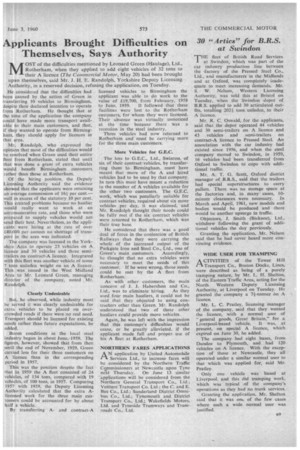Applicants Brought Difficulties on Themselves, Says Authority
Page 43

If you've noticed an error in this article please click here to report it so we can fix it.
MOST of the difficulties mentioned by Leonard Green (Haulage), Ltd., Rotherham, when they applied to add eight vehicles of 32 tons to their A licence (The Commercial Motor, May 20) had been brought upgn themselves, said Mr. J. H. E. Randolph, Yorkshire Deputy Licensing Authority, in a reserved decision, refusing the application, on Tuesday.
He considered that the difficulties had been caused by the action of Green in transferring 10 vehicles to Birmingham, despite their declared intention to operate from Rotherham. He thought that at the time of the application the company could have made more transport available to their main customers, and that, if they wanted to operate from Birmingham, they should apply for licences in that area.
Mr. Randolph, who expressed the Opinion that most of the difficulties would be resolved when Green used their entire fleet from Rotherham, stated that until that was done a grant of extra vehicles would benefit Birmingham customers rather than those at Rotherham.
Of the hiring position, the Deputy Licensing Authority said the evidence showed that the applicants were retaining an average commission of 16.1 per cent.— well in excess of the statutory 10 per cent. This created problems because no haulier would really want to work at an unremunerative rate, and those who were prepared to supply vehicles would not send their best. Nevertheless, as the applicants were hiring at the rate of over £40.000 per annum no shortage of transport in the area was indicated.
The company was licensed in the Yorkshire Area to operate 23 vehicles on A licence and 30 vehicles and three semitrailers on contract-A licence. Integrated with this fleet was another vehicle of some 7 tons unladen weight on an A licence. This was issued in the West Midland Area to Mr. Leonard Green, managing director of the company, noted Mr. Randolph.
Clearly Undesirable
But, he observed, while industry must he served it was clearly undesirable for extra vehicles to be placed on overcrowded roads if there were no real need. Transport should be licensed for existing needs rather than future expectations, he added.
Boom conditions in the local steel industry began in about June, 1959. The figures. however, showed that from then _until the end of November, 1959, Green carried less for their three customers on A licence than in the corresponding period in 1957.
This was the position despite the fact that in 1959 the A fleet consisted of 24 vehicles, of 134 tons, compared with 19 vehicles, of 100 tons. in 1957. Comparing 1957 with 1959, the Deputy Licensing Authority calculated that the extra Alicensed work for the three main customers could be accounted for by about half a vehicle.
By transferring Aand contract-A licensed vehicles to Birmingham the applicant was able to do work to the value of £19,700, from February, 1958 to June, 1959. It followed that these facilities were lost to the Rotherham customers, for whom they were licensed. Their absence was virtually unnoticed at the time because there was a recession in the steel industry.
Three vehicles had now returned to Rotherham and must be carrying more for the three main customers.
More Vehicles for G.E.C.
The loss to G.E.C., Ltd., Swinton, of six of their contract vehicles, by transferring them to Birmingham, must have meant that more of the A and hired vehicles had to be used by that company. In turn this must have meant a reduction in the number of A vehicles available for the other two customers. The G.E.C. work, which was peculiarly suitable for contract vehicles, required about six more vehicles per day, it was claimed, and Mr. Randolph thought their needs could be fully met if the six contract vehicles were returned to Rotherham, which Was their true base.
He considered that there was a good deal of force in the contention of British Railways that. they were carrying the whole of the increased output of the Parkgate Iron and Steel Co., Ltd., one of Green's main customers. Accordingly, he thought that no extra vehicles were necessary to meet the needs of this customer. If he were wrong, those needs could be met by the A fleet from Rotherham.
As with other customers, the main concern of J. I. Habershon and Co., Ltd., was to eliminate hiring. As they used four main hauliers, it could not be said that they objected to using contractors other than Green. Mr. Randolph understood that two of these other hauliers could provide more vehicles.
Again, he was left with the impression that this customer's difficulties would cease, or be greatly alleviated, if the applicant made full and proper use of his A fleet at Rotherham.
NORTHERN FARES APPLICATIONS
AN application by United Automobile Services Ltd., to increase fares will be considered by the Northern Traffic Commissioners at Newcastle upon Tyne
next Thursday. On June 13 similar "applications will be considered from the Northern General Transport Co., Ltd.; Venture Transport Co. Ltd.; the C. and E. Bus Co., Ltd.; Sunderland District Omnibus Co., Ltd.; Tynemouth and District Transport Co., Ltd.; Wakefields Motors, Ltd. and Tyneside Tramways and Tramroads Co, Ltd.
















































































































